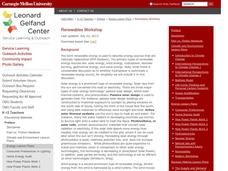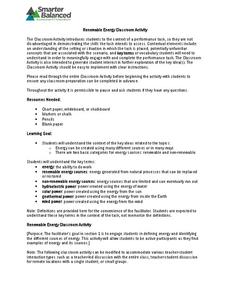National Energy Education Development Project
Exploring Hydropower
In 2006, about 20 percent of the world's electricity was generated from hydroelectric power. In the presentation, scholars review the water cycle and gravitational energy to begin to understand how humans harness the power of water. They...
Carnegie Mellon University
Hydroelectricity
Use a simple PowerPoint presentation to introduce you environmental studies class to hydropower. Hold a debate about the pros and cons of developing this form of alternative energy. Power up your class with this simple lesson on a topic...
Teach Engineering
Fluid Power Basics
What can bulldozers and screen doors have in common? Use this lesson on fluid power to find out. It begins with some simple teacher demonstrations, includes a couple of videos, and culminates with an inquiry-based activity to investigate...
Carnegie Mellon University
How Power Plants Work 1
First of three lessons, this is a great start to a unit on energy. As you demonstrate, learners discover different types of energy and how it is converted from one form to another. They then focus in on the generation of electricity by...
Carnegie Mellon University
Renewables Workshop
Youngsters examine resource maps to find out which states are using solar and wind power and discuss as a class various other renewable energy sources. They use a provided data table to record pros and cons to each technology, build and...
Scholastic
Study Jams! Renewable Fuels
A single slide introduces each of the following renewable energy sources: hydroelectric, wind, geothermal, solar, tidal, and biomass. This provides a succinct overview that you can use as a visual aid when you first introduce alternative...
Scholastic
Study Jams! Electricity
Shock your physical science class using this video to teach the basics of static electricity. Electricity is defined,and electrons are differentiated from protons on an atom model. The use of hydropower and wind are explained as ways of...
Government of South Australia
Don't Waste Your Energy
Don't lift another finger, this physical and environmental science unit has everything you need to begin teaching your class about energy. Starting with a look at the greenhouse effect, these lessons and activities take young scientists...
Smarter Balanced
Renewable Energy
Renewable and non-renewable energy sources are the focus of a series of activities that prepare learners for a performance task assessment on energy. Groups identify the various sources of energy and classify these sources as either...
Polytechnic Institute of NYU
Potential vs. Kinetic Energy
Legos in science class? Watch your pupils fall in love with this activity. After learning to measure potential and kinetic energy, young scientists create their own ramps using Lego Mindstorm sensors and software.
Global Oneness Project
Reclaiming Rivers
Robert Hass's article "Rivers and Stories" underscores the importance of rivers in the development of civilization and the importance of reclaiming supposedly dead rivers and implementing policies that protect river health. Groups...
Columbus City Schools
It’s Electric!
Shocking! Who knew so many great ideas existed for teaching middle schoolers about electricity? Find them all within this energetic framework. You'll light up at the variety of printable and web-based resources within! After building...
Other popular searches
- Hydroelectric Power Plants
- Hydroelectric Power Energy
- Hydropower Energy
- Hydropower Experiments
- Hydropower Electricity
- Hydropower Plant
- Hydropower Lesson Plans












